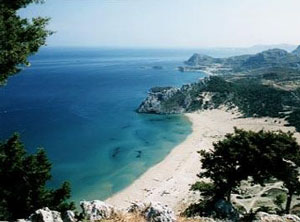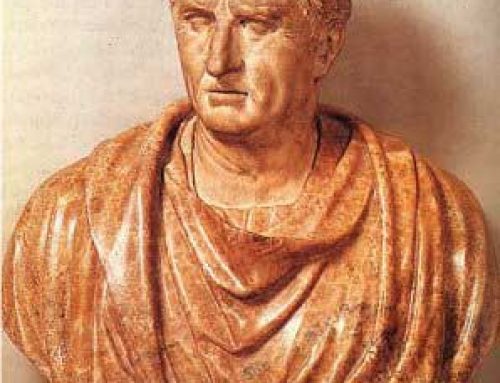
Ancient Greek climate: The island of Rhodes
Good fishing
Fishing was very important to early Stone Age people, and fishing is probably what brought the first people to Greece.
No part of Greece is more than about forty miles from the sea: a couple of days walking. So Greece was a great place to fish and to collect seafood like mussels, octopus, oysters, and shrimp.
Where do mussels come from?
More Ancient Greece articles
Animals in ancient Greece
There were a lot more different kinds of animals in ancient Greece than there are today. Like today, there were hares (like rabbits), deer, mice, foxes, squirrels, beavers, bears, wild pigs, and much more. But in ancient Greece there were also more dangerous animals like wolves and mountain lions, and even regular lions. People eventually killed all of these dangerous animals, and now there aren’t any left.
A good source of obsidian
Greece has a lot of good ports and beaches. Plus there are a lot of small islands as well. Some of these islands are a good place to get obsidian, which might be another reason why people moved to Greece.
All about obsidian and volcanoes

A Greek hillside
Not great for farming
On the other hand, the soil in Greece is not very good for growing things. There are a lot of mountains that make it hard to walk from one place to another, and there is never enough fresh water. In Greece, plants tend to be small and scrubby: thyme bushes, sage, olive and fig trees, laurel, and little thin evergreens like juniper and oleander.
The history of olives and olive oil
Traders, sailors, pirates, raiders
The combination of good sailing and lousy farming encouraged Greek people to get their living from the sea. Many Greeks were fishermen.
More about the history of fishing
Other Greek people sailed trade routes from one city to another, both Greek cities and elsewhere, all over the Mediterranean Sea and the Black Sea, and made a living buying and selling things. Some Greek men hired themselves out as soldiers to fight for other people around the Mediterranean, especially in West Asia and Egypt (where there is money to pay them). And, sure, ancient Greeks also often became pirates or raiders to make a living, as in the Trojan War.
Mercenary soldiers: fighting for money

An earthquake knocked down the Temple of Zeus at Olympia
Earthquakes and volcanoes
Another important thing about the Greek environment is that it is very unstable. Greece is smack-dab in the middle of a very active volcanic zone, where the Europe tectonic plate meets the Africa tectonic plate.
What is a tectonic plate?
How do volcanoes work?
Why do earthquakes happen?
There are several active volcanoes, and earthquakes are also very common. You get a nervous feeling that there could be a natural disaster at any time. This got the Greeks interested in a particular kind of religion which we call oracles. Oracles are the gods speaking to people, often in the form of minor earthquakes, and the gods tell the people what is going to happen in the future.
Oracles in ancient Greece
Cutting down the trees
One final observation: the Greek landscape does not look the same today as it did in the Bronze Age. There used to be quite a lot of trees on the hillsides of Greece, but people cut most of them down, and now the hills of Greece are mostly bare, or have little bushes on them.
Nobody is quite sure when exactly the trees were cut down, but very likely it has to do with the beginning of using iron in Greece, around 800 BC. You have to heat iron very hot (1537 degrees Centigrade) in order to melt it, and that takes a lot of wood fires.
How did people invent iron?
Yeah, but what was the weather like?
Learn by doing: eat some Greek food
Bibliography and further reading about the climate in ancient Greece:
Greece the Land (Lands, Peoples & Cultures), by Sierra Adare (1998). Geography, climate, and more.
Ecology of the Ancient Greek World, by Robert Sallares (1991). Not easy going, even for adults, but very interesting.





do u talk about inventions that was INVENTED by Greeks ?
Yes! You’ll find them here: https://quatr.us/greeks/ancient-greek-science.htm
that was ok
This was extremely helpful thanks a lot for this great piece of information ????
Oh, I’m so happy to hear it! Thanks for writing to let me know.
I am doing a project on posidien could you help me
Sure, what did you want to know? Our article on Poseidon is here: https://quatr.us/greeks/poseidon-greek-gods.htm
Hey, I’m doing a project on posidien and I heard you’re really smart, could you help me out?
Sure, I’d be happy to, Evangelene! What questions do you have for me? You’ll find our article on Poseidon here: https://quatr.us/greeks/poseidon-greek-gods.htm
yolo
not very use full
Sorry you feel that way! What were you trying to find out?
this was very use full thx
hey whats up
I need help i have to do a test soon could ya help me out?
Sure! How can I help?
you could have added a few more things to make this a little more informational like you should add weather, what they mainly ate like fish but i’m talking about what else they ate, what there shelter looked like, but everything else was ok. btw not trying to criticize bc i prolly couldn’t write this.
Oh, Bree, I am happy to say we have all of those things! You’ll find them here:
Weather: https://quatr.us/greeks/ancient-greek-weather.htm
Greek food: https://quatr.us/greeks/ancient-greek-food.htm
Greek houses: https://quatr.us/greeks/ancient-greek-houses.htm
Next time can you write about animals and mabey how they helped greeks
Sure, Tam! Here are some of our articles about the animals people had in ancient Greece:
Sheep and goats: https://quatr.us/west-asia/history-sheep-ancient-sheep-goats.htm
Horses: https://quatr.us/central-asia/where-do-horses-come-from.htm
Donkeys: https://quatr.us/africa/history-donkeys-sudan.htm
Cows: https://quatr.us/central-asia/domesticated-cattle-central-asia.htm
Chickens: https://quatr.us/china/history-chickens.htm
Fish: https://quatr.us/africa/history-fishing-fishing-nets-shellfish-boats.htm
some of thees websites doesn’t include info about the animals in GREECE
Hi! That’s a good point. I’ll add something about the animals to this article.
Could you posibly add why the physical features and human characteristics of Greece influenced the development of civilizations it would be quite helpful. Thanks though for the article.
This sounds like your homework assignment? I think you’ll find some answers in the article, but I also think that civilization emerges in Egypt and West Asia and China, not in Greece, so maybe you should look there.
Can you add more about climate?
I’m sorry, but that’s not really a question. What did you want to know about the climate?
this was very boring
Sorry! I added subheadings to help you find the answers to your questions faster. I hope that will help.
This is trash its not right
Sorry you feel that way! What do you think is wrong? We’d be eager to fix anything that is incorrect, and of course we do make mistakes – like anybody.
im very confused
What are you trying to find out? Maybe I can help.
this was not helpful at allll
Sorry to hear it. What were you trying to find out?
hi
Hi Olivia! Thanks for stopping by!
Tanks u for helpng
This was very helpful.
hi
Hi! Thanks for stopping by!
This was very helpful ??
Thanks!
oh okay then